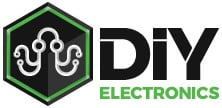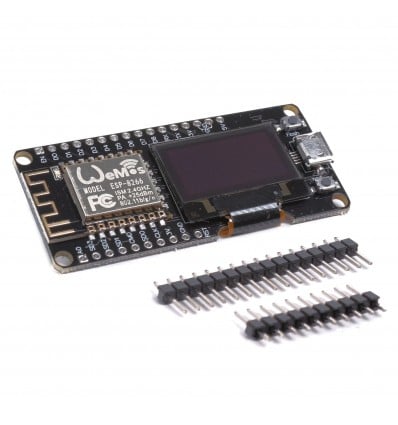International shipping Secure payment
No products
Prices are tax included
Product successfully added to your shopping cart
There are 0 items in your cart. There is 1 item in your cart.
Arduino-compatible D-duino V1 Module with onboard 0.96 OLED Display, for building real-time API reporting devices like world clocks or stock price tickers.
5+ In Stock Items
Warning: Last items in stock!
Free shipping on orders over R1250 - courier delivery and within South Africa
The D-duino V1 is a specially designed ESP8266 & NodeMCU Module with an onboard 0.96 OLED Display and native WiFi capabilities. It is an easy-to-use and inexpensive solution to building your own real-time online API devices, which can monitor specific variables, tickers, timers and other values on the net and display changes to those values in real time via the OLED display. This makes it a great board for anyone who is interested in IoT, stock prices, crypto trading or any other hobbies and professions in which real-time API data is important.
The board comes with an onboard micro USB port, two onboard buttons for Flash and Reset, a complete integrated ESP8266 module with antenna, as well as a 0.96inch OLED display that has been permanently connected to the board. This is pretty much all of the necessary Components you need to build your own API-data gadgets, already installed on the board and ready for programming. It is capable of being programmed via both Arduino IDE and NodeMCU LUA, making it one of the most user-friendly boards available - with all of the libraries and software packs available online.
These features all culminate to form a truly impressive Development Board, which is small enough to fit within the palm of a hand while still offering a full complement of functionality.
D-duino V1: ESP8266 & NodeMCU Module - Technical Specifications: |
|
|
– ESP8266-12F |
|
– 3.3V DC |
|
– 80MHz / 160MHz |
|
– Micro-USB Female |
|
– RESET / FLASH |
|
– 0.96” OLED |
|
– 12 (write/read/interrupt/pwm/I2C/one-wire supported) |
|
– 1 (D0) |
|
– 4MB |
|
– 64.3 x 29.1mm |
Typical Applications for the D-duino V1 ESP8266 & NodeMCU Module:
The D-duino V1 - ESP8266 & NodeMCU Module with 0.96 OLED Display is a surprisingly diverse board despite the low number of components on the PCB. This, in conjunction with the fact that it can be programmed via Arduino IDE or LUA, makes it one of the easiest boards to use. And because all of the necessary libraries and tutorials are freely available on the internet, almost anyone can get this board and immediately start developing their own unique IoT devices or gadgets.
With this in mind, it’s not surprising that some of the top projects involving the D-duino V1 include:
-
Building a stock or crypto price-monitoring device that updates prices every few minutes to keep you informed of how your investments (or potential investments) are looking.
-
Designing a world clock that keeps track of different times around the world, letting you know exactly what the time is wherever your partners, associates, contractors or family are located.
-
Developing your own “Pocket-Tweets” device, which monitors specific Twitter profiles and reports their daily Tweets directly to you.
These are just a few examples of how this board can be used for real-time API data reporting, although there are definitely hundreds of other use cases for you to still experiment with. So consider trying your hand at one of these specialized boards if you are interested in IoT or want to try building your own API-data devices. It is not only easy to use with optional Arduino IDE and NodeMCU LUA programming, but also inexpensive when considering the quality of components and highly specialised design.
Additional Resources:
-
ESP8266 SDK Guide (Software Development Kit)
-
Full D-duino Tutorial written by the board-maker
-
Video Demo of D-duino as a Web Server
-
Video Demo of D-duino as a Web Piano
No customer reviews for the moment.
Espressif Systems have their headquarters based in Shanghai Zhangjiang High-Tech Park, which is considered to be “China’s Silicon Valley”, where they produce low-power WiFi and Bluetooth SoC’s and IoT hardware and software.
Their vision is to enhance the world by leveraging modern technologies like IoT and wireless communications to manufacture products that are more versatile, adaptable and eco-friendly, with the aim of reducing the amount of waste and pollution that the world produces each year. So far, they have been able to reduce the consumption of electrical components by hundreds of thousands of resistors, capacitors, inductors, baluns, switches and power management chips, while reducing the amount of Printed Circuits Boards, or PCB’s, by more than 50,000 square meters.
Espressif is quickly becoming the leading manufacturer of IoT and wireless components, modules and devices that cut out the need for cabling and unnecessary electronics, which will not only result in a world that is cleaner and more environmentally sustainable, but also more adaptable and capable of moving towards the future of human technologies.








